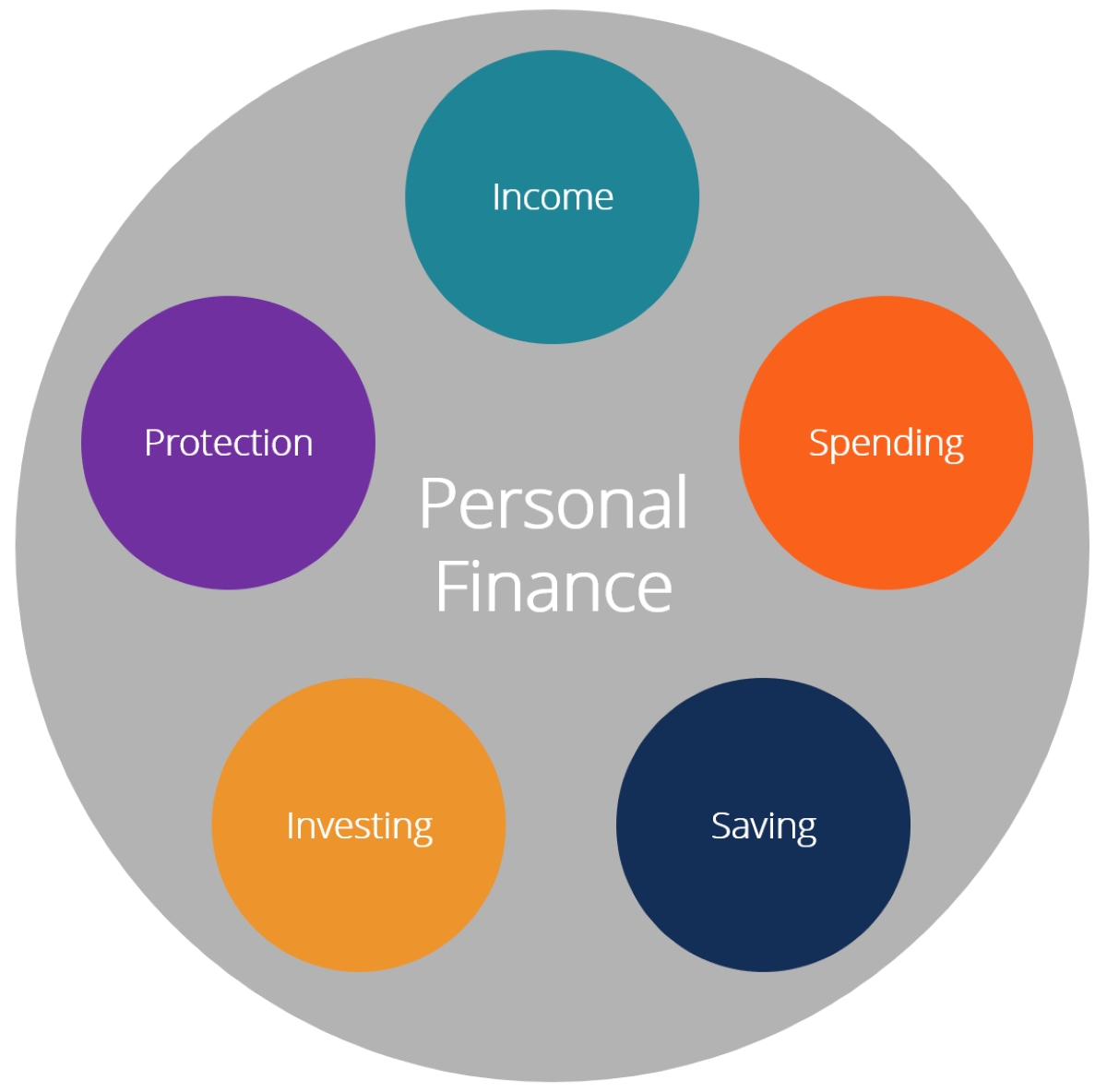

Finance
What Are The 5 Areas Of Personal Finance?
Published: January 22, 2024
Discover the 5 key areas of personal finance and take control of your financial future. Learn how to manage your money and achieve financial success.
(Many of the links in this article redirect to a specific reviewed product. Your purchase of these products through affiliate links helps to generate commission for LiveWell, at no extra cost. Learn more)
Table of Contents
- Understanding the Foundations of Personal Finance
- Mastering the Art of Financial Planning
- Cultivating Financial Resilience through Strategic Saving
- Navigating the Path to Wealth Accumulation
- Shielding Your Financial Fortunes with Comprehensive Protection
- Navigating the Terrain of Taxation: Maximizing Efficiency and Compliance
Introduction
Understanding the Foundations of Personal Finance
Welcome to the world of personal finance, where every decision you make regarding your money can have a profound impact on your future. Whether you’re a recent graduate embarking on your career journey, a seasoned professional looking to secure your retirement, or someone in between, mastering the principles of personal finance is crucial for achieving financial stability and prosperity.
Personal finance encompasses a wide array of financial topics and disciplines, all of which are interconnected and vital for managing your monetary resources effectively. From budgeting and saving to investing and insurance, each facet plays a pivotal role in shaping your financial well-being. Moreover, understanding the implications of taxes and how they influence your financial landscape is equally essential.
In this comprehensive guide, we will delve into the five fundamental areas of personal finance, equipping you with the knowledge and insights needed to navigate the intricate world of money management. By gaining proficiency in these key areas, you can cultivate a solid financial foundation that empowers you to make informed decisions, mitigate risks, and work towards achieving your short- and long-term financial goals.
So, let’s embark on this enlightening journey through the realms of budgeting, saving, investing, insurance, and taxes, unraveling the intricacies of each domain and uncovering the strategies to optimize your financial standing.
Budgeting
Mastering the Art of Financial Planning
At the core of sound financial management lies the art of budgeting. A budget serves as a blueprint for your financial resources, providing a structured framework for allocating income towards expenses, savings, and investments. By meticulously outlining your income and expenditures, you gain clarity on where your money is flowing and can identify opportunities for optimizing your financial resources.
Creating a budget involves a systematic assessment of your income sources, including salaries, bonuses, and any additional sources of revenue, juxtaposed with your regular expenses such as rent or mortgage payments, utilities, groceries, and transportation costs. Moreover, factoring in discretionary spending on leisure activities, dining out, and entertainment is crucial for a comprehensive budget.
One of the primary objectives of budgeting is to foster a disciplined approach towards spending, enabling you to prioritize essential expenses while curbing unnecessary outlays. This, in turn, facilitates the accumulation of savings and the ability to allocate funds towards investments that can yield long-term returns.
Embracing technology can significantly enhance the budgeting process, with a myriad of personal finance apps and software available to streamline expense tracking, goal setting, and financial analysis. These tools empower individuals to monitor their financial health in real-time, offering insights that facilitate informed decision-making and proactive adjustments to spending patterns.
Ultimately, a well-crafted budget serves as a compass for your financial journey, guiding you towards prudent money management, debt reduction, and the realization of your financial aspirations. By mastering the art of budgeting, you lay a solid foundation for achieving financial stability and propelling yourself towards a prosperous future.
Saving
Cultivating Financial Resilience through Strategic Saving
Amidst the dynamic landscape of personal finance, the practice of saving stands as a cornerstone of financial resilience and security. Saving entails setting aside a portion of your income for future needs, emergencies, and long-term objectives, thereby fortifying your financial foundation and mitigating unforeseen risks.
Establishing a robust saving habit involves a multifaceted approach, encompassing short-term savings for immediate contingencies, such as medical expenses or car repairs, as well as long-term savings earmarked for significant milestones like homeownership, education, or retirement. By delineating specific saving goals, individuals can imbue their financial journey with purpose and direction, fostering a sense of control and preparedness.
Moreover, leveraging dedicated savings accounts or instruments tailored for different objectives, such as high-yield savings accounts, certificates of deposit (CDs), or retirement accounts like 401(k)s or IRAs, enables individuals to optimize their savings potential through accrued interest and tax advantages.
Embracing frugality and conscientious spending habits complements the act of saving, as it bolsters the accumulation of financial reserves and instills a mindful approach towards consumption. Additionally, harnessing automated transfers to divert a portion of income directly into savings vehicles cultivates a disciplined saving routine, ensuring consistent progress towards financial goals.
Furthermore, the concept of ‘paying yourself first’ underscores the significance of prioritizing savings before allocating funds to discretionary expenses, reinforcing the notion that saving is not merely residual, but a deliberate and integral component of financial planning.
By integrating saving as a fundamental tenet of your financial strategy, you fortify your resilience against economic uncertainties, capitalize on growth opportunities, and pave the way for a secure and prosperous financial future.
Investing
Navigating the Path to Wealth Accumulation
Embarking on the journey of investing heralds a pivotal milestone in the realm of personal finance, offering a gateway to wealth accumulation and long-term financial prosperity. Investing entails deploying financial resources into various vehicles, such as stocks, bonds, mutual funds, real estate, and other assets, with the aim of generating returns and building a robust portfolio.
One of the cardinal principles of investing revolves around the concept of risk and return. By delineating your risk tolerance and investment horizon, you can tailor your investment strategy to align with your financial objectives, whether they encompass capital appreciation, income generation, or a blend of both.
Diversification emerges as a cornerstone of prudent investing, as it mitigates risk by spreading investments across different asset classes and sectors, thereby safeguarding against market volatility and potential downturns. Additionally, harnessing the power of compounding through reinvesting dividends and interest amplifies the growth potential of investments over time.
Moreover, staying abreast of market trends, economic indicators, and company performance empowers investors to make informed decisions and capitalize on opportunities for growth and value creation. Harnessing the expertise of financial advisors or investment professionals can provide valuable insights and guidance in navigating the complexities of the investment landscape.
Furthermore, embracing a long-term perspective and exercising patience are integral facets of successful investing, as they enable individuals to weather market fluctuations and harness the potential for sustained growth and wealth accumulation over time.
By cultivating a strategic and diversified investment portfolio, individuals can harness the power of compounding, capitalize on growth opportunities, and work towards realizing their financial aspirations, thereby charting a course towards enduring financial prosperity.
Insurance
Shielding Your Financial Fortunes with Comprehensive Protection
Embracing the realm of insurance constitutes a pivotal facet of holistic financial planning, offering a shield of protection against unforeseen adversities and mitigating potential financial risks. Insurance serves as a bulwark, safeguarding individuals and their assets from the financial repercussions of unforeseen events, ranging from medical emergencies and property damage to liability claims and loss of income.
One of the fundamental principles of insurance revolves around risk management, wherein individuals transfer the financial burden of potential losses to an insurance provider in exchange for periodic premiums. This symbiotic arrangement offers peace of mind and financial security, assuring individuals that they are shielded from the adverse financial ramifications of unforeseen events.
Various forms of insurance cater to diverse facets of life, encompassing health insurance, which defrays medical expenses and facilitates access to quality healthcare, and property insurance, which safeguards homes, vehicles, and other tangible assets against damage or loss. Additionally, life insurance stands as a testament to financial prudence, offering a safety net for loved ones and dependents in the event of an individual’s demise.
Embracing comprehensive insurance coverage aligns with the ethos of prudent risk mitigation, empowering individuals to navigate life’s uncertainties with confidence and resilience. Furthermore, periodic reassessment of insurance needs and policy coverage ensures that individuals remain adequately protected in the face of evolving circumstances and life stages.
Moreover, leveraging the expertise of insurance professionals and staying informed about policy intricacies and coverage nuances empowers individuals to make informed decisions, aligning insurance provisions with their unique needs and risk profiles.
Ultimately, integrating insurance as a cornerstone of your financial strategy fortifies your resilience against unforeseen adversities, offering a shield of protection that underpins your financial well-being and fosters peace of mind amidst life’s myriad uncertainties.
Taxes
Navigating the Terrain of Taxation: Maximizing Efficiency and Compliance
Taxation constitutes an integral component of personal finance, exerting a profound impact on individuals’ financial landscapes and necessitating a nuanced approach towards compliance and optimization. Understanding the intricacies of taxation empowers individuals to navigate the terrain of tax laws, optimize their financial efficiency, and fulfill their civic responsibility while minimizing the burden of taxation.
One of the pivotal facets of tax management revolves around strategic planning and compliance, encompassing prudent utilization of tax-advantaged accounts, deductions, and credits to optimize tax efficiency. Leveraging retirement accounts such as 401(k)s or IRAs not only fosters long-term financial security but also offers tax benefits, enabling individuals to defer taxes on contributions and potentially lower their taxable income.
Moreover, staying abreast of tax deductions and credits, such as those related to education expenses, homeownership, and charitable contributions, offers avenues for reducing tax liabilities and maximizing savings. Engaging the services of qualified tax professionals or utilizing reputable tax preparation software can facilitate accurate and comprehensive tax filings, ensuring compliance with regulatory requirements while capitalizing on available tax benefits.
Furthermore, embracing a proactive approach towards tax planning, especially in the realm of investment taxation and capital gains, empowers individuals to optimize their investment strategies while mitigating tax implications. By aligning investment decisions with tax considerations, individuals can capitalize on tax-efficient investment vehicles and strategies, thereby enhancing their after-tax returns.
Additionally, periodic review and adjustment of tax strategies in response to legislative changes and evolving financial circumstances are essential for maintaining tax efficiency and compliance. Staying informed about tax reforms and seeking professional guidance enable individuals to adapt their tax planning strategies in alignment with the prevailing regulatory landscape.
By navigating the terrain of taxation with prudence and foresight, individuals can optimize their tax efficiency, fulfill their fiscal obligations, and harness the potential for maximizing savings and long-term financial prosperity within the bounds of regulatory compliance.














